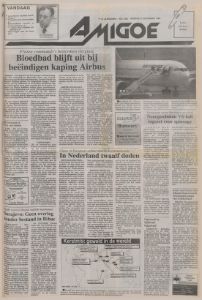About the day » Tuesday December 27, 1994Calender converter
December 28, 1994 
 December 26, 1994
December 26, 1994
Born on Tuesday December 27, 1994
- Dylan DELOOF, Oostende († 1995)
Died on Tuesday December 27, 1994
- Abbie Lott (89), Seminary, Covington, Mississippi, United States of America
- Arnolda Maria Dingemans (80), Tilburg, Noord-Brabant, Nederland
- Aukje Stienstra (85), Bergum (Burgum), Friesland, Nederland
- Chester Carlton Corey (75), Phoenix, Maricopa, Arizona, United States
- Adrianus Johannes Megens (63), Nijmegen, Nederland
- Allan Douglas WOOD (76), Latrobe, Tasmania, Australia
- Bruno VREVEN (32)
- Alida Catharina van den Bergh (86), Schoorl
- Catharina Huberta Gooren (81), Venray, Li.NL
- Aaltiena Popken (91), Dwingeloo
Source: Delpher (KB | national library) Newspapers from December 27, 1994 at Delpher
Born on December 27
- 1990 » Max Lindholm, Finnish figure skater
- 1990 » Milos Raonic, Canadian tennis player
- 1991 » Danny Wilson, Scottish footballer
- 1991 » Michael Morgan, Australian rugby league player
- 1992 » Joel Indermitte, Estonian footballer
- 1992 » Maicel Uibo, Estonian decathlete
- 1993 » Olivia Cooke, English actress
- 1995 » Mark Lapidus, Estonian chess player
- 1995 » Timothée Chalamet, American actor
- 1997 » Ana Konjuh, Croatian tennis player
Died on December 27
- 1992 » Kay Boyle, American novelist, poet, and educator (b. 1902)
- 1993 » André Pilette, Belgian race car driver (b. 1918)
- 1993 » Evald Mikson, Estonian footballer (b. 1911)
- 1993 » Feliks Kibbermann, Estonian chess player and philologist (b. 1902)
- 1994 » Fanny Cradock, English author and critic (b. 1909)
- 1994 » J. B. L. Reyes, Filipino lawyer and jurist (b. 1902)
- 1995 » Genrikh Kasparyan, Armenian chess player and composer (b. 1910)
- 1995 » Shura Cherkassky, Ukrainian-American pianist (b. 1909)
- 1997 » Billy Wright, Northern Irish loyalist leader (b. 1960)
- 1997 » Brendan Gill, American journalist and essayist (b. 1914)
Names that were popular for boys in 1994
Names that were popular for girls in 1994
Source: Wikipedia Historical events 1994
- Koningin Beatrix (Huis van Oranje-Nassau) was from April 30, 1980 till April 30, 2013 sovereign of the Netherlands (also known as Koninkrijk der Nederlanden)
- In The Netherlands , there was from Tuesday, November 7, 1989 to Monday, August 22, 1994 the cabinet Lubbers III, with Drs. R.F.M. Lubbers (CDA) as prime minister.
- In The Netherlands , there was from Monday, August 22, 1994 to Monday, August 3, 1998 the cabinet a href="https://nl.wikipedia.org/wiki/Kabinet-Kok_I" class="extern">Kok I, with W. Kok (PvdA) as prime minister.
- The Netherlands had about 15.3 million citizens.
- January 11 » The Irish Government announces the end of a 15-year broadcasting ban on the IRA and its political arm Sinn Féin.
- September 16 » The British government lifts the broadcasting ban imposed against members of Sinn Féin and Irish paramilitary groups in 1988.
- October 21 » In Seoul, South Korea, 32 people are killed when a span of the Seongsu Bridge collapses.
- November 8 » Republican Revolution: On the night of the 1994 United States midterm elections, Republicans make historic electoral gains by securing massive majorities in both houses of congress (54 seats in the House and eight seats in the Senate, additionally). Thus bringing a close to four decades of Democratic domination.
- November 9 » The chemical element darmstadtium is discovered.
- December 14 » Construction begins on the Three Gorges Dam on the Yangtze river.
Weather December 27, 1994
The temperature on December 27, 1994 was between 5.3 °C and 11.3 °C and averaged 9.3 °C. There was 37.1 mm of rain during 21.5 hours. The almost completely overcast was. The average windspeed was 4 Bft (moderate breeze) and was prevailing from the southwest.
